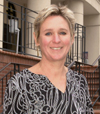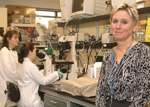Young is welcome breeze for research excellence
by Cindy AbolePublic Relations
The winds have shifted at MUSC and the Ralph H. Johnson VA Medical Center with the arrival of researcher Rita Young, Ph.D. But new challenges and the promise of brighter research horizons keep the center on course towards continued success.
 Dr.
Rita Young
Dr.
Rita Young
Young arrived last summer to assume the helm of associate chief of staff for research and development, filling a post once occupied by a crew of talented research clinician predecessors. With more than 25 years of valuable research and administrative experience and the approval of top VA brass, Young now has the opportunity to contribute to larger research priorities while furthering her studies in cancer research and immunotherapy.
Young’s course to Charleston began several years ago when MUSC Department of Medicine Chairman John Feussner, M.D., who was then Department of Veterans Affairs chief research and development officer, first spoke to her about Charleston, MUSC and its strong affiliation with the VA Medical Center.
Young headed research and development in a similar position at the Edward Hines Jr. VA Hospital and served in various academic and research capacities at Loyola University of Chicago for 18 years before heading south.
“One of the strengths of this institution is the success it has had with interdisciplinary collaborations and interdependent relationships,” said Feussner, who joined MUSC in 2002. “There’s more ability to develop teamwork and a collaborative relationship between scientists and researchers than in larger institutions. It’s a positive cultural characteristic that makes it a clear strength when recruiting senior and junior investigators and scientists.”
Another mark of distinction is last year’s recognition of the VA’s National Committee for Quality Assurance (NCQA) Accreditation, a process that is believed to be more rigorous than the medical center’s Joint Commission on Accreditation of Health Care Organizations (JCAHO). In 2002, the Department of Veterans Affairs required all VA research programs to undergo clinical research accredita-tion for their human subjects protection program. Participating sites were evaluated for quality, compliance and accountability. Using MUSC’s Institutional Review Board (IRB), the VA Medical Center earned the top score of 96.4, the best in the country.
“This is a big plus to the university,” said Young. “It speaks well of MUSC’s IRB. In turn, it boosts the level of confidence in the university and their human subjects protection program.”
Although much of the credit for the accreditation’s success goes to Young’s predecessor, John Raymond, M.D., now MUSC vice president for academic affairs and provost, and to the institution’s IRB team, it will be Young’s responsibility to help manage and maintain this level of quality.
“Dr. Young is a mover and a shaker. She is an outstanding researcher and possesses excellent interpersonal skills. She’s an outstanding partner on the leadership level who's committed to excellence,” said Raymond. “At Hines, she has proven her abilities in developing a quality clinical care and research program. We’re hoping to apply her expertise toward enhancing both clinical and basic research at MUSC and the Ralph H. Johnson VA Medical Center.”
Also sharing Feussner’s interest in recruiting Young for her research talent and abilities were Raymond, College of Medicine Dean and Vice President for Medical Affairs Jerry Reves, M.D., and Ralph H. Johnson VA Medical Center chief of staff Flo Hutchison, M.D.
 Newcomer
Dr. Rita Young, right, with colleagues Belinda Stilley and Deanne Lathers
in her research lab at Gazes/Thurmond Research Building.
Newcomer
Dr. Rita Young, right, with colleagues Belinda Stilley and Deanne Lathers
in her research lab at Gazes/Thurmond Research Building.
“Although small, our VA research program has emerged to become a quality research program thanks to our talented staff, the active support of MUSC leadership and the strengths of a cordial academic partnership,” said Hutchison. “With the presence of Dr. Young, our eyes our aimed at the future and new directions that are appropriate to our mission.”
A native of New York City, Young has the dual role of managing both bench and clinical research at the VA facility, while helping to establish mentoring opportunities for faculty and staff. Although based at the VA, Young’s primary appointment is as professor of medicine with secondary appointments in the Departments of Pathology and Otolaryngology. She has been tasked to contribute to one of the university’s major research priorities by building cancer research activities at the VA and at Hollings Cancer Center. Her own research interests focus on tumors, especially of the head and neck, plus the development of therapeutic strategies for the treatment of cancers.
“Head and neck cancers are very immune inhibitory,” Young said. “If we can figure out how to prevent immune suppression, then this will provide an opportunity to use immunotherapy to stimulate that cancer, similar to how a transplanted kidney or organ can be rejected. The tumor thus becomes the enemy.”
Young meets regularly with the head and neck cancer team and other cancer teams composed of surgeons, physicians and researchers.
“Our MUSC head and neck cancer surgeons are research-oriented,” Young said. “This gives us a chance to understand and work with both a basic science and clinical perspective. We need that clinical partner to stay relevant to the clinical issues and to confirm that the bench work complements the clinical needs.”
“On a research perspective, MUSC is just a great environment,” Young said. “People are supportive and helpful. We have a very strong research team. What’s also surprising and pleasant is the synergy between VA and MUSC researchers, particularly in the Gazes/Thurmond Research Building. You’d never know of any divisions—sharing equipment, collaborations, etc. It’s definitely a unique and positive venture between the VA and MUSC.”
Since her arrival six months ago, she’s helped MUSC/VA win a developmental grant in health services research, thus providing generous start-up support for a five-year period and opening the door for more VA investigators to submit program project grants. A second grant will enhance awareness of research programs for minority investigators working with the pilot program Project Export. The award will also promote health disparities education, specifically hypertension, diabetes, patient-physician communication, etc.
A career participant in the VA’s research development awards program, Young established herself at Hines VA Hospital, attaining the distinction of senior research career scientist, an internationally prestigious award for non-clinician career investigators considered tops in their field. Young was one of two senior research career scientists at Hines and among a select group of scientists nationally.
At Hines/Loyola University, Young managed the research program working with residents in the ENT department. Loyola residents were required to complete a four-month rotation in bench research. She’ll have that chance working with MUSC’s ENT residents who already have credible bench research collaborations. Young will help mentor and recruit more VA career scientists within MUSC’s campus. The VA possesses several professional development programs to provide funding awards for salary support, mentoring, training and research opportunities for clinical and non-clinical scientists. To help manage paperwork and applications, Young was fortunate to recruit former Hines colleague Pat Slagle to work in collaborating with applicants and the Office of Research Development.
“Dr. Young's background and leadership supports the VA’s new emphasis
on the development of career clinical investigators,” Raymond said. “We
need to develop clinical investigators who are experienced and well-versed.
It supports the VA’s commitment and creates an atmosphere of strong research
and clinical growth where students and researchers can work effectively.”
Catalyst Online is published weekly, updated as
needed and improved from time to time by the MUSC Office of Public Relations
for the faculty, employees and students of the Medical University of South
Carolina. Catalyst Online editor, Kim Draughn, can be reached at 792-4107
or by email, catalyst@musc.edu. Editorial copy can be submitted to Catalyst
Online and to The Catalyst in print by fax, 792-6723, or by email to petersnd@musc.edu
or catalyst@musc.edu. To place an ad in The Catalyst hardcopy, call Community
Press at 849-1778.